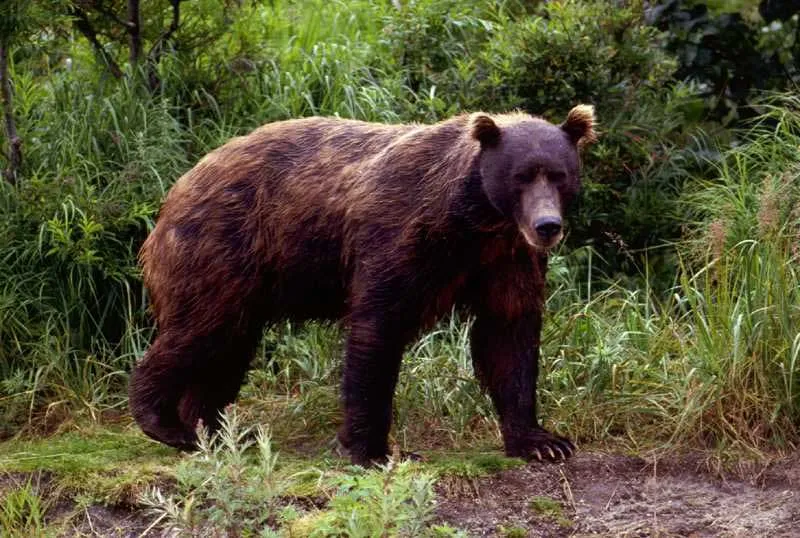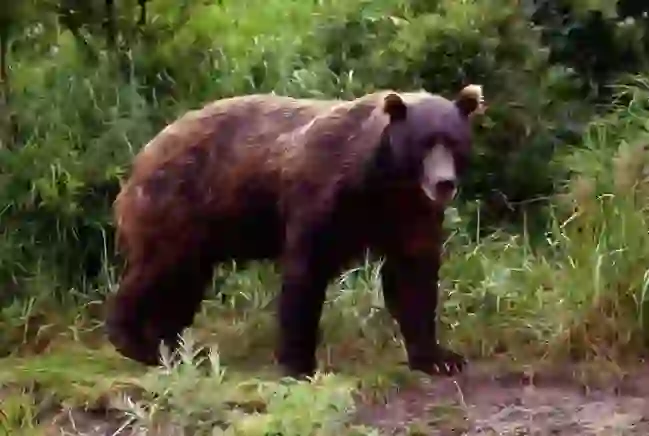
Kamchatka Brown Bear
Kamchatka Brown Bear
Kamchatka Brown Bear
The Kamchatka Peninsula in Russia, a land of majestic volcanoes and glaciers. Here lives the Kamchatka brown bear, known as one of the largest brown bears in the world. The sight of them catching salmon as they swim upstream is particularly breathtaking! Join us as we explore the dynamic ecology of these impressive bears.
Kamchatka Brown Bear Basic Infomation

| Property | Value |
|---|---|
| Scientific Name | Ursus arctos beringianus |
| Taxonomic Status | SUBSPECIES |
| Rank | SUBSPECIES |
| Vernacular Names | Kamchatka Brown Bear |
| Kingdom | Animalia |
| Phylum | Chordata |
| Class | Mammalia |
| Order | Carnivora |
| Family | Ursidae |
| Genus | Ursus |
| Habitats | Kamchatka Peninsula, Russia |
| Descriptions | The Kamchatka brown bear inhabits the Kamchatka Peninsula in Russia and is particularly known for its salmon-catching behavior. |
| Conservation Status | Least Concern |

Size
Their body length is about 2.2 to 2.8 meters, and their shoulder height reaches 1.2 to 1.5 meters. They weigh a whopping 300 to 700 kilograms! They are known as one of the largest subspecies of brown bears.

Lifespan
About 20 to 30 years in the wild. Many individuals live long lives, with some even exceeding 35 years.

Distribution
They mainly inhabit the Kamchatka Peninsula in Russia. They are adapted to a variety of environments, including mountainous regions, forests, and wetlands along rivers.
Kamchatka Brown Bear Q&A

What is the origin of the name 'Kamchatka brown bear'?
As the name suggests, it is named after its habitat, the "Kamchatka Peninsula." The 'beringianus' in the scientific name "Ursus arctos beringianus" comes from the Bering Sea surrounding the Kamchatka Peninsula.

What do Kamchatka brown bears eat?
Kamchatka brown bears are omnivores, but they especially love salmon! Every year from summer to autumn, they wait for the salmon to swim upstream and catch them with gusto. They also eat fruits, plants, small animals, and insects.

Do they hibernate?
Kamchatka brown bears, like other bears, hibernate during the winter. They eat a lot in the fall, especially salmon, to store fat and spend the winter sleeping in snow-covered caves or burrows. They wake up from hibernation in the spring and resume their activities.

[Quiz!] What is the most common food for Kamchatka brown bears?
The biggest event of the autumn for Kamchatka brown bears is… salmon fishing! They catch the salmon that fill the rivers with amazing dexterity. They truly deserve the title of "giant fisherman."

[Quiz!] Where do Kamchatka brown bears hibernate?
To survive the harsh winter, Kamchatka brown bears hibernate in a safe and warm place. The places they choose for hibernation are… snow-covered caves and burrows dug in the ground! Sometimes they even use the warm ground in volcanic areas.

[Quiz!] Are Kamchatka brown bears dangerous to humans?
Kamchatka brown bears are one of the largest brown bears in the world and can attack humans. However, they generally tend to avoid humans and rarely attack unless approached or provoked. It is important to exercise caution when entering their habitat.

Would you like to become a part of the 'Animalbook.jp'?
Turn your knowledge into Q&A and share it with the world. ※Publication will be activated after purchase. Let's share information together!
Kamchatka Brown Bear Type of List

Characteristics of Kamchatka Brown Bears
- One of the largest brown bears in the world
- Inhabit the Kamchatka Peninsula in Russia
- Primarily feed on salmon
- Hibernate
- Important as a tourist attraction
Information
Congratulations! You are the first commenter!

Create Your Favorite List!
Kamchatka Brown Bear
Save the animals you love! Build your own list to quickly revisit your favorites later.

Would you like to leave a comment?
※Please note: This is for the purchase of rights to post comments within the article.
Find Your Favorites!
Our shop offers a unique and attractive selection of goods themed around various animals.
Kamchatka Brown Bear References
Kamchatka Brown Bear Introduction of media used

By Собствена творба, Public Domain, Link

Help Enrich Our Animalbook.jp with Your Media!
We are constantly looking to expand and enrich our Animalbook.jp with amazing photos and videos of animals. If you have any media that you'd like to share, please contribute and help us showcase the beauty and diversity of the animal kingdom. Your submissions will be credited and featured in our encyclopedia, reaching a wide audience of animal lovers.


















